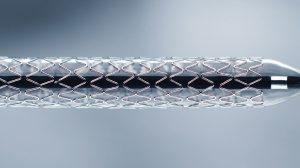NEW YORK (Reuters Health) – In patients with atherosclerotic renal artery stenosis (ARAS) and impaired renal function who are receiving aggressive medical therapy, renal artery stenting offers little benefit and may cause serious complications, including death, new research shows.
Although stents are often used to treat ARAS, data supporting this practice is lacking, Dr. Liesbeth Bax, from University Medical Center Utrecht, the Netherlands, and co-researchers explain. Moreover, no studies to date have examined how aggressive medical therapy might influence the renal component of ARAS.
The present investigation, described in the June 16th issue of the Annals of Internal Medicine, involved 140 patients with ARAS of 50% or greater and a creatinine clearance of <80 mL/min per 1.73 meters-squared. The subjects were randomized to receive aggressive medical therapy (antihypertensive agent, statin, and aspirin) with or without renal artery stenting and were followed for 2 years.
The percentage of patients who reached the primary endpoint—a 20% or greater drop in creatinine clearance—was not that much lower in the stent group compared with controls: 16% vs. 22% (HR = 0.73). The authors comment that given the wide confidence intervals, this finding was “inconclusive.”
Two procedure-related deaths, both involving arterial perforation, occurred in the stent group. One late death due to an infected hematoma was also seen in the stent group. One stent patient required permanent dialysis following cholesterol embolism.
“Our findings favor a conservative therapeutic approach to patients with ARAS, focused on cardiovascular risk factor management without stenting,” the researchers conclude.
Reference:
Ann Intern Med 2009;150:840-848.




